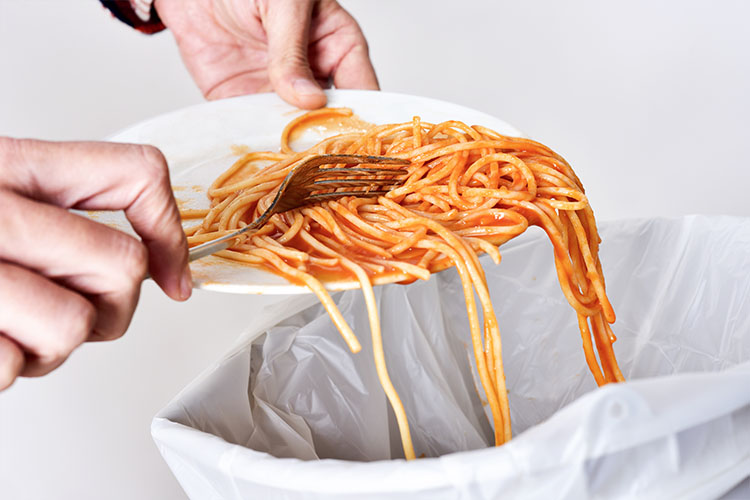Blog
Don’t waste your food!
 Oh food. How we love food! A great pleasure in life is sharing a meal with loved ones, or tucking into decent dollop of shepherds pie you have been craving since last Wednesday.
Oh food. How we love food! A great pleasure in life is sharing a meal with loved ones, or tucking into decent dollop of shepherds pie you have been craving since last Wednesday.
For many of us, a decent portion of the weekly budget is spent on chow. And apparently, a decent portion is then thrown away.
We in our humble Australian homes are thought to throw out 1 in every 5 shopping bags worth of food.2 35% of municipal waste is food! Yikes.
It is estimated, on average, each household discards over $1000 of food each year, comprising mostly of fresh produce and leftovers. We are pretty much throwing hard-earn cash into the trash.
Food waste isn’t only in the hands of the householders. Big business has a lot to contribute too.
Food down the loo
At the other end of the spectrum, food producers can throw away a heart-breaking amount of food. It is estimated that one third of food produced for human consumption is lost every year.1
For example, some big chain commercial bakeries are required to bake until closing, meaning the bread left, if not able to be passed on to those in need, is thrown. Chucked. Discarded. Wasted.
This is a monumental waste of food that could be re-purposed, and surely a waste of money for the vendors!
A recent study estimated that if food manufacturers in developed nations reduced food waste by 50% throughout post harvest handling and storage, processing and packaging, distribution, and consumption, we would feed 63 million people in developing countries. Not only is that an incredible start to dealing with any global food shortage, it will also decreases the amount of land needed to grow food, amount of water used, and greenhouse gases emitted.4
Sometimes food must be discarded for safety. That is understandable (if costly). But other justifications for throwing out food include re-branding, overproduction, damaged or incorrectly adhered labels, or sometimes in the case of restaurants and retailers, it is just easier.
Fortunately organisations such as OzHarvest here in Australia exist to do everything they can to collect and share food from manufacturers, restaurateurs and retailers, avoiding the dumpster and instead delivering that perfectly good food to those in need.
Why we should care
What does it mean to us, the householder, the average Joe?
Consider the resources to get food your fridge – water, transport, packaging, power are just a few elements involved in the production and transportation of getting stuff to our supermarket shelves.
And then there is the methane and greenhouse gases emitted from foods rotting in the tip.3
Sure – a huge amount of food waste takes place somewhere along the production and transportation line. But curbing the amount of food thrown from your household will undoubtedly make a difference to the earth, whilst saving you the money!
If we can combat food waste, we may also begin to contribute directing food to those in need, and avoid the apparent need to farm on Mars (yes. This is happening).5;6
Here a few things to consider that you can do at home to help make the most of the food you buy:
- Fill your plate with plants – veg can be cheap, filling and wonderfully nutritious! Re-use (below 2ºC) or re-heat (to above 60ºC) with less fear of some nasty bacterial proliferation.
- Love the ugly – 20-40% of fresh produce doesn’t make it to supermarket shelves because it doesn’t look perfect. Love the lumps and bumps, and find your local grower or supplier to buy from.
- Buy what you need – if you can, plan ahead for meals, and don’t shop when you re hungry.
- Don’t mistake best before as used by – the former is an indication of quality and the latter exists for safety.
- Pack the freezer – think it is turning? Freeze it! It will come in handy.
- Store well – separate apples, bananas and citrus from other food (they encourage ripening), buy seasonally, and store in containers in the fridge.
Save food, save cash, and help save the planet. Brilliant!
By Angela Johnson (BHSc Nut. Med.)
References:
- FAO 2011, Global food losses and food waste – Extent, causes and prevention, Rome
- Foodwise 2016, Fast Facts on Food Waste,, viewed 7 June 2016, <http://www.foodwise.com.au/foodwaste/food-waste-fast-facts/>.
- Mason, L. Boyle, T Fyfe, J Smith, T & Cordell, D 2011, ‘National Food Waste Data Assessment: Final Report’, Prepared for the Department of Sustainability, Environment, Water, Population and Communities, by the Institute for Sustainable Futures, University of Technology, Sydney.
- Munesue, Y, Masui, T, & Fushima, T 2015, ‘The effects of reducing food losses and food waste on global food insecurity, natural resources, and greenhouse gas emissions’, Environmental Economics & Policy Studies, vol. 17, no. 1, pp. 43-77.
- Wageningen University and Research Centre 2016, ‘First tomatoes, peas harvested on Mars, moon soil simulant’, ScienceDaily, viewed 7 June 2016, <www.sciencedaily.com/releases/2016/03/160308085926.htm>.
- Wamelink, GW, Frissel, JY, Krijnen, WJ, Verwoert, MR, & Goedhart, PW 2014, ‘Can plants grow on Mars and the moon: a growth experiment on Mars and moon soil simulants’, Plos One, vol. 9, no. 8, p. e103138.











